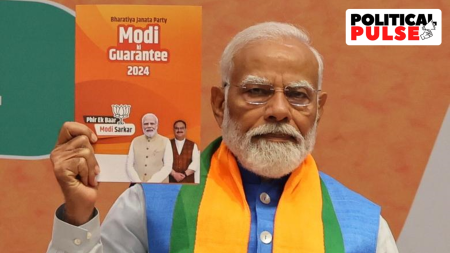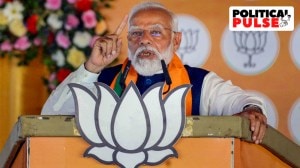- India
- International
Unless Joe Biden wins big, America stares at a constitutional crisis
If Trump is ahead on November 3, legal and political manoeuvres are quite possible. Only a Biden victory that night, not one after the full count, can preempt such possibilities.
 Democratic presidential candidate Joe Biden. (AP Photo/File)
Democratic presidential candidate Joe Biden. (AP Photo/File)Having lived in the US for long, I have watched all US presidential elections since 1988. I don’t recall any election being viewed as more important than this one, though 2008 must surely be counted as matching in significance, when America elected Barack Obama as the nation’s first Black president. Indeed, 2020 can be viewed as 2008’s possible other.
If 2008 showed that America could live up to its political creed of equality, we now have grave threats to that foundational principle. Given Donald Trump’s barely disguised racism, his victory will be viewed as America’s regress into White primacy, an unfortunate historical reality which began to lose its sting after the mid-1960s. And his defeat will be welcomed by those who want Blacks and other racial minorities to reclaim the push for equality. The results will be viewed through a racial lens even if Trump’s handling of the pandemic, rather than his treatment of race relations, causes his defeat.
The international significance of this election is also unmistakable. If Joe Biden wins, the US will return to its international alliances, dictators will be embraced less ardently, and human rights will play a role in American foreign policy.
Trump will lose the popular vote, as he did in 2016, and as three other presidents did in 1876, 1888 and 2000. But we know that it is the electoral college, not the popular vote, which determines the outcome. The electoral college has 538 state-based votes (plus Washington DC). To emerge victorious, a candidate has to win 270 electoral votes.
The electoral college is simultaneously mystifying and simple. A state’s electoral votes depend on its representation in the two houses of US Congress, founded on two different principles. The House of Representatives is based on population size, but each state, regardless of its population size, also has two members in the US Senate. Thus, the electoral votes of a state are its seats in the House, plus two. The smallest seven states have three votes each (one House seat plus two senators). And following the same principle, the largest states are California (55 votes), Texas (38), New York (29), Florida (29), Illinois (20) and Pennsylvania (20). Other states have less than 20 votes each. In 2016, one electoral vote in Wyoming, a tiny state, represented 190,000 people, whereas California, the largest state, had one electoral vote per 680,000 citizens.

The gap between popular and electoral votes is a historically charged matter. It will suffice to note that American states are powerful. In a well-known conceptual formulation, Alfred Stepan called the US a “coming together federation”, as distinct from a “holding together federation,” like India. Compared to the former, states are weaker in the latter. Unlike most federations, 13 former British colonies, as states, came together to form the US in the 1780s, keeping considerable powers as a basis for joining the union.
Also read | An Expert Explains: Why the 2020 US Election matters to India
So, how will Trump and Biden fare in the electoral college? This customary question now has a new twist: How will early voting, expanded in most states due to the pandemic, influence the final count? As of writing this, 72 million votes have already been cast, a historical record. Before Election Day, November 3, this number could touch 85-90 million. That would be more than half of the total votes, expected to be somewhere between 150-160 million.
Early votes are of two types: In person and mailed in. How many thus far fall in which category is not obvious. But two things are clear. First, early votes are expected to be disproportionately Democratic, whereas voters on Election Day will be disproportionately Republican. Second, some states accept mailed-in ballots only till Election Day, but others can wait until days after so long as the ballots have an Election Day postmark. Many states won’t have their final tally of votes on the night of November 3.
Trump has been denouncing mailed-in votes as fraudulent for months, though no systematic evidence supporting this claim exists. However, his castigation of postal ballots, likely to be in tens of millions, does have serious implications.
Consider three scenarios: 1) Trump ahead on Election Night, but losing days later when mailed ballots are fully counted; 2) Biden slightly ahead on November 3, his lead becoming decisive as mailed ballots are counted; and 3) Trump routed on Election Night, making postal ballots irrelevant to the outcome.
Unlike so many countries, the US does not have an independent national election commission. States have the responsibility to announce results, and, based on them, it is left to the presidential candidates to claim victory and concede defeat. Without a sense of political ethics, such voluntary expectations can go awry. Nobody associates Trump with ethical conduct.
If Trump is ahead on Election Night, he is likely to claim victory and also legally challenge the validity of mailed ballots in the US Supreme Court, which has a new judge nominated by Trump, giving the court a conservative majority. Election results can thus get mired in legal battles for weeks. And if the highest court, agreeing with Trump’s claim of fraudulence, nullifies mailed ballots, whereas states certify their election results after the full count, the US will have a full-blown constitutional crisis on its hands.
This outcome can be ruled out if Trump is decisively defeated on November 3. He won 306 electoral college votes in 2016, 36 more than required, coming primarily from his victory in three traditionally Democratic states: Pennsylvania (20), Michigan (16) and Wisconsin (10). Most polls show Biden ahead in all three. In addition, some of the states Trump won in 2016 — Florida (29), North Carolina (15), Arizona (11) and Iowa (6) — are looking uncertain for him. Any combination of these states will generate a Biden victory.
But the polls may be wrong. Moreover, they are predictions about the total votes in a state, both votes cast on November 3 and earlier. We don’t know what will happen on the night of November 3, when many states will not have counted their mailed ballots. If Trump is ahead on November 3, legal and political manoeuvres are quite possible. Only a Biden victory that night, not one after the full count, can preempt such possibilities.
The world will carefully watch the night of November 3. There is no doubt that America’s foundational principles are at stake.
Also read | Ahead of the US polls, Indian-Americans are grappling with the racial system like never before
This article first appeared in the print edition on October 30, 2020 under the title ‘A long November night’. The writer is Sol Goldman professor of international studies and professor of political science at Brown University.
40 Years Ago
EXPRESS OPINION
More Explained
Apr 16: Latest News
- 01
- 02
- 03
- 04
- 05









































